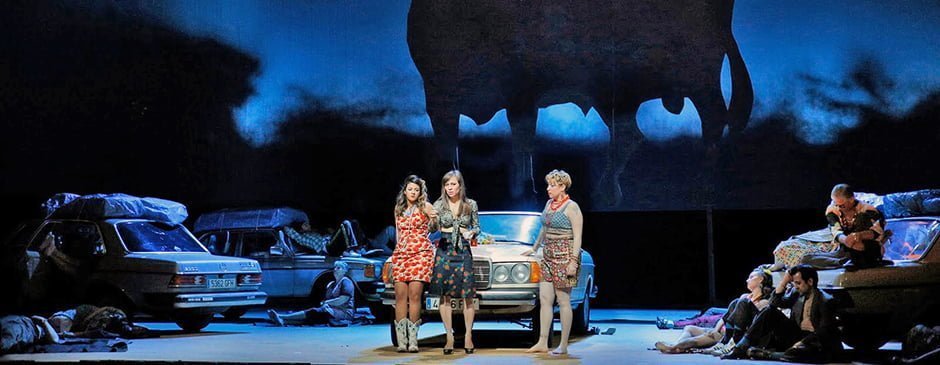This is an article from January 2022, also published on the Opera Gazet Facebook-page under the title “The Other Unstoppable Virus” that undermines the Regietheater. The only stated similarity to any other virus is that it is “unstoppable”. No mention is made of any parallelism with other aspects (killing, spread varieties).
But Mr.Jorden/La Cieca/Parterrebox put words in my mouth in an unsavory way: as if I would not take the deaths of any virus seriously and would trivialize them. A cowardly, mean-spirited suggestion.
Then he started scolding me for “fucking insensitive jerk”: “Yeah, Regie has killed nearly 6 million people worldwide. What a fucking insensitive jerk you are.” About Mr. Jorden’s education, I have my thoughts.
After I objected, three times, Jorden did not react, and remained in his dark, malodorous cave. Then, he got a little scared anyway, and changed his response to the wording as it stands now on the Facbook Opera Gazet page: “Yeah, Regie has killed nearly 6 million people worldwide.. See also “View edit history” below that Facebook post.
Not a word of apology, and choosing a cowardly escape route. That’s the way Mr. James Jorden handles things. Mr. Jorden is not so brave. Quickly hiding something and not saying a word about it. Sitting still and hope it blows over.
What a sad mentality.
——————————————————————————–
It has been almost 15 years since Heather Mac Donald, political commentator, essayist, lawyer, and author, published her article “The Abduction of Opera” in the City Journal. Her article, which adequately wipes the floor with Regietheater and explains the murky antecedents of the abject phenomenon, is as relevant, if not more relevant, than ever, 15 years later. It has one disadvantage, however: it is too long, and for many that is a reason not to read it. Since opera in the Netherlands has been bon ton among cultural parvenus, roughly since the opening of the Dutch opera house “Het Muziektheater” in the 1980s, the ever-growing blind acceptance of directorial trash has been inversely proportional to the staggering decline of the most basic knowledge of opera. We like to play eavesdropper on the conversations of the white wine-sipping audience in the foyer during intervals of performances. Without lapsing into anecdotal casuistry, our observation is that there is more “opera savvy” in the audience at an amateur performance than at a Traviata pastiche at Amsterdam’s Muziektheater, where Regietrash is a guiding artistic principle.
Why do the Emperor’s Clothes enjoy a relentless, quicksand-based admiration? Where are the roots of the misconception that a director is as important as the composer and librettist, if not more important?

Regietheater in Europe is one of the most depressing artistic developments of our time.
Although singers, orchestra members, and conductors have serious reservations, they too depend on government subsidies and the dubious interactions between subsidizer and the postmodern cultural elite that holds up their hands.
The so-called “updating” (read: taking out of context) of operas is a serious form of barbarism. The New York critic Alex Ross rightly observed that there is a serious intellectual laziness underlying the idea “that the past must be problematized, and that older works must be ‘rescued’ from their ideological presuppositions.”

For the origins of Regietheater, like the origins of a range of social problems, we must go back to the 1960s. Not only was the stage and concert practice under attack by a band of Marxist intellectuals, students, and artists, but opera also had to be liberated from “bourgeois values.” Gérard Mortier led a group of student provocateurs in the late 1960s who loudly disrupted opera productions they considered “too traditional.” In the opera house, works from the past had to be twisted so they mirrored our so much more interesting selves.
Michael Gielen, the Frankfurt proponent of Regietheater, declared that what Haendel wanted in his operas was irrelevant; more important was “what interests us … what we want.”

The aforementioned Gérard Mortier once stated that when updating operas, he tries “to transform a work from a certain era so that it conveys something fresh in our time.” Complete idiocy, of course. Nothing is less “fresh” than the tiresome iconography of refrigerators, Cadillacs, wheelchairs, and Kalashnikovs. What is really new about an opera by Mozart is that it comes from a world that no longer exists. And it is the music in particular that expresses that difference. When directors tear operas out of their historical context, they close a precious window on the past. When we refuse to take episodic norms and values seriously, we not only render the plot incomprehensible (the idiotic discrepancy between stage image and text is swallowed for granted in our time), but we also close ourselves off from a better understanding of “wie es gewesen ist” [“how it was”, a term from historiography].


Being attacked by James Jordan , unfortunately, is a common occurance to anyone who writes about opera, or even comments something he disagrees with. The very commonality ensures that by now Jordan has no credibility beyond that of an opera Karen, spewing bitchiness everywhere. There are no opinions that differ from his, so he attacks the person who makes them. Famous for being a MEAN QUEEN, not for being an expert on opera.
Using phrases like “What a fucking insensitive jerk you are.” points to a lack of education and perhaps a consequent lack of inner civilization. Perhaps we should show some compassion….
Thanks. I suspected something like this.
The insult is the typical resource of those who have no substantial answer. In such cases, in Italy we use to quote e line from Dante (The Divine Comedy): “Non ti curar di lor, ma guarda e passa” (Don’t pay attention to them, but look and walk on).
This is an article, published on the Opera Gazet Facebook-page under the title “The Other Unstoppable Virus”) that undermines the Regietheater. The only stated similarity to any other virus is that it is “unstoppable”. No mention is made of any parallelism with other aspects (killing, spread varieties). But Mr.Jorden/La Cieca/Parterrebox put words in my mouth in an unsavory way: as if I would not take the deaths of any virus seriously and would trivialize them. A cowardly, mean-spirited suggestion. Then he started scolding me for “fucking insensitive jerk”: “Yeah, Regie has killed nearly 6 million people worldwide. What a fucking… Read more »
Bij het eindapplaus dat “ordinaire gefluit”, en het applaus als de muziek nog speelt. Geen respect voor cast, orkest en koor.
Vele denken, we staan in een kroeg, of we zijn bij de Toppers met een glas bier in de handen. Bij de opname Aria, werd het fluiten aanbevolen.
Hierop heb ik een e-mail naar MAX gestuurd, met de uitleg van Bravo, Brava, en Bravi,
helaas bij mijn volgende opname, je raadt het al, de opname leider, mensen applaus en ………!
🎼🌷🌷🌷🌷🎼